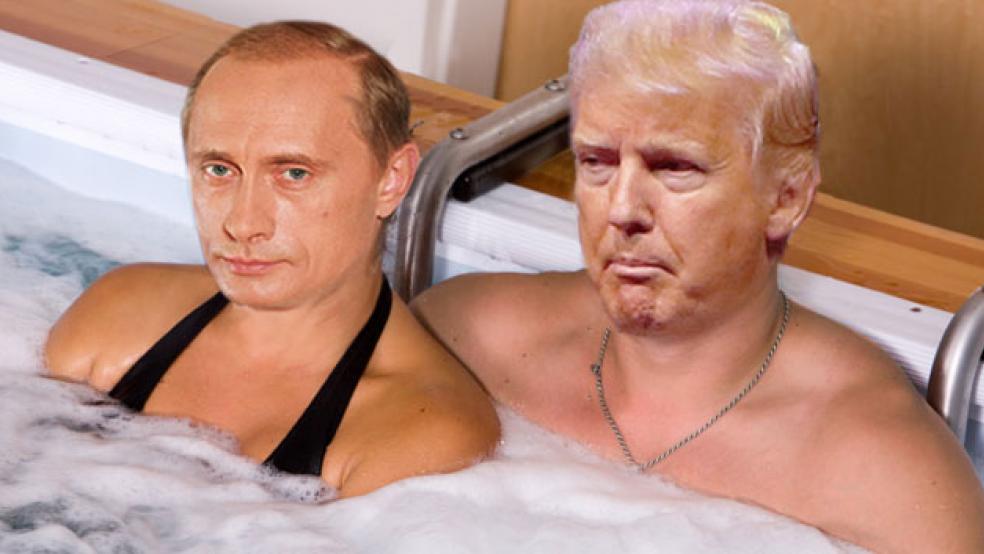The body of evidence suggesting that Russian government-backed hackers were responsible for penetrating the email servers of the Democratic National Committee and arranging the transfer of nearly 20,000 internal emails to WikiLeaks has been built up to the point where few people outside the Kremlin challenge it anymore.
However, what’s less clear in this case is the motive. The leaked emails unquestionably damaged Hillary Clinton’s presidential campaign. But it is possible, as Clinton campaign manager Robby Mook suggested over the weekend, that they were released “for the purpose of actually helping Donald Trump?”
Related: More Tumult Ahead at Messy Democratic Convention
Believing that Russian intelligence agencies with the presumed blessing of President Vladimir Putin are actively trying to help Donald Trump to become the next president of the United States would require also believing that Putin wants Trump in the Oval Office. Are there any good reasons to believe that Putin, or any world leader for that matter, would want to see the mercurial billionaire as the commander-in-chief of the most powerful military in the world?
Well, now that you mention it...
“There is a clear case to be made that Vladimir Putin’s interests would be better served by having Donald Trump as president than Hillary Clinton,” said Susan Hennessey, a fellow at the Brookings Institution and the managing editor of its Lawfare blog.
First off, she pointed out, is Trump’s oft-repeated claim that he would like to see a much closer relationship between the US and Russia, along with his statements of personal admiration for Putin himself. With that more intimate relationship, presumably, would come more willingness to turn a blind eye to Russia’s increasingly aggressive behavior with its neighbors and beyond.
Related: Sanders Can’t Promise to Rein in His Angry Supporters
Which leads to another reason why Putin might like to see Trump in the White House.
“The US, since the cold war, has operated as the primary check on Russian aggression around the world,” said Hennessey. That check has mainly taken the form of NATO, the mutual defense organization that Trump has repeatedly labeled as obsolete.
Vladimir Mikheev, a Russian foreign policy analyst who writes for websites friendly to and often owned by the Russian government, says that is music to Putin’s ears.
“Trump’s treatment of NATO as a costly enterprise with little benefit to the U.S. (‘We certainly can’t afford to do this anymore’) is a welcome change of tune,” he wrote in an article listing the possible benefits to Russia of a Trump presidency.
Related: Economists, Blogs and Donald Trump
Trump’s suggestion that the US might reduce its commitment to NATO, and his warning that he might ignore the mutual defense agreement that is the alliance’s cornerstone if he felt other countries hadn’t contributed enough money, said Hennessey, is “pro-Russian in a way that is not only unprecedented but was inconceivable” before Trump came on the scene.
“The US commitment to NATO is considered an article of faith in the foreign policy community,” she said. “The basic premise of the commitment to mutual defense and mutual aid is accepted by everyone.”
However because the mutual defense requirement has never been invoked, a consistent signal from national leaders that their treaty obligations would be honored is “incredibly important,” she said. Not only does it help maintain trust among NATO members but it also preserves the deterrent effect that comes with the promise of an automatic and overwhelming military response to aggression against member states.
Another reason why Putin might prefer to see Trump in the White House is that he and his inner circle in the Kremlin are quite familiar with the alternative.
Related: Trump Gets a Big Bump in the Polls as Democrats Clash
“They really, really hate Hillary Clinton,” said Hennessey. “Certainly in their minds, he is the lesser evil.”
That’s because, during her time as secretary of state, Clinton developed a reputation for pushing back hard against Russian provocations and has so far given every indication that she would be a more aggressive opponent of Russian adventurism in Syria and elsewhere than the Obama administration has been.
Finally, she notes, Trump has surrounded himself with advisors who appear to be more sympathetic to Russia than the US foreign policy establishment as a whole. His campaign manager, Paul Manafort, worked closely with Putin ally Viktor Yanukovych, the deposed ruler of Ukraine.
Carter Page, another Trump advisor, has accused the Obama administration of fomenting the revolution in Ukraine that ousted Yanukovych -- a position that dovetails almost perfectly with Putin’s account of what happened in Ukraine. Retired Army General Michael Flynn, the former head of the Defense Intelligence Agency who clashed with the Obama administration over Russia policy and took a controversial meeting with Putin, is also an advisor.
Related: Can Bernie Sanders Save the Democratic Convention?
To be sure, there is no hard evidence of an effort by Putin to help Trump defeat Clinton in November. And in a statement translated and released by the state-run Russian news service TASS, Kremlin spokesperson Dmitry Peskov explicitly denied any connection.
"In general, we still see manic attempts to use the Russian topic in U.S. electoral campaign,” he said. The “usual fun and games” he continued, are “not really good for bilateral relations.”
However, there is a credible case to be made that even if Putin did not himself engineer the leaked emails to boost Trump and damage Clinton, he probably isn’t terribly sad about the result.





